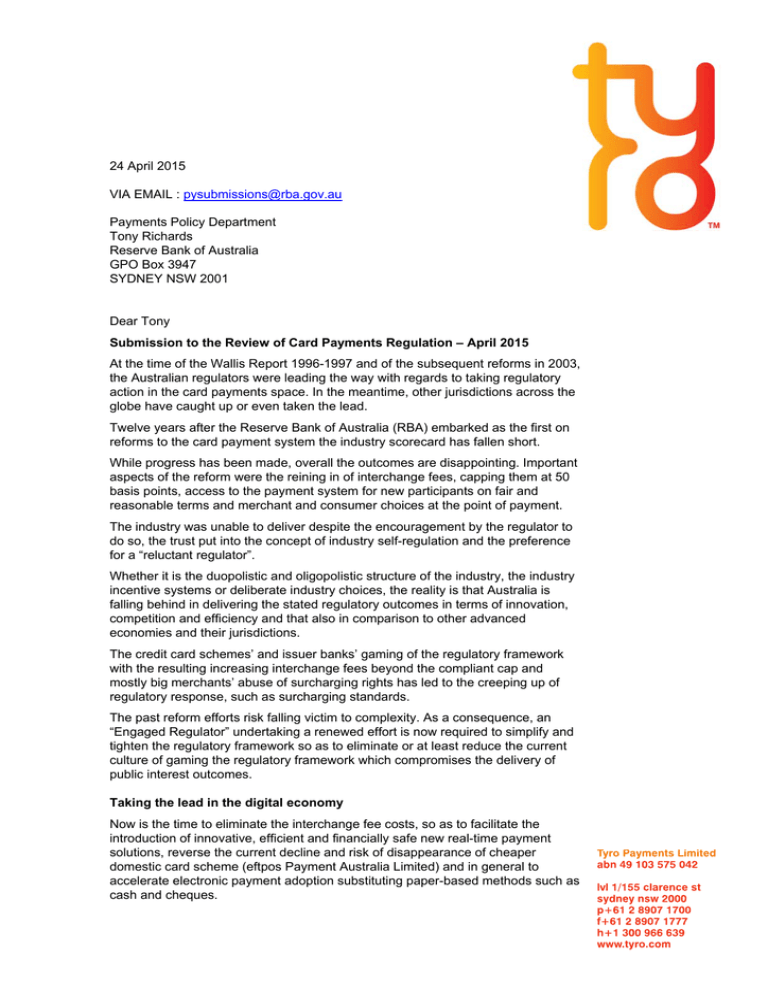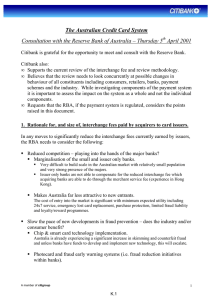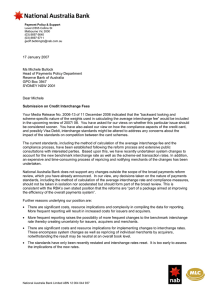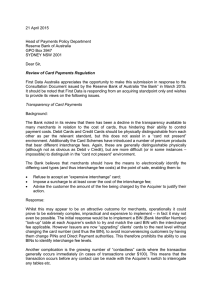24 April 2015 VIA EMAIL : Payments Policy Department
advertisement

24 April 2015 VIA EMAIL : pysubmissions@rba.gov.au Payments Policy Department Tony Richards Reserve Bank of Australia GPO Box 3947 SYDNEY NSW 2001 Dear Tony Submission to the Review of Card Payments Regulation – April 2015 At the time of the Wallis Report 1996-1997 and of the subsequent reforms in 2003, the Australian regulators were leading the way with regards to taking regulatory action in the card payments space. In the meantime, other jurisdictions across the globe have caught up or even taken the lead. Twelve years after the Reserve Bank of Australia (RBA) embarked as the first on reforms to the card payment system the industry scorecard has fallen short. While progress has been made, overall the outcomes are disappointing. Important aspects of the reform were the reining in of interchange fees, capping them at 50 basis points, access to the payment system for new participants on fair and reasonable terms and merchant and consumer choices at the point of payment. The industry was unable to deliver despite the encouragement by the regulator to do so, the trust put into the concept of industry self-regulation and the preference for a “reluctant regulator”. Whether it is the duopolistic and oligopolistic structure of the industry, the industry incentive systems or deliberate industry choices, the reality is that Australia is falling behind in delivering the stated regulatory outcomes in terms of innovation, competition and efficiency and that also in comparison to other advanced economies and their jurisdictions. The credit card schemes’ and issuer banks’ gaming of the regulatory framework with the resulting increasing interchange fees beyond the compliant cap and mostly big merchants’ abuse of surcharging rights has led to the creeping up of regulatory response, such as surcharging standards. The past reform efforts risk falling victim to complexity. As a consequence, an “Engaged Regulator” undertaking a renewed effort is now required to simplify and tighten the regulatory framework so as to eliminate or at least reduce the current culture of gaming the regulatory framework which compromises the delivery of public interest outcomes. Taking the lead in the digital economy Now is the time to eliminate the interchange fee costs, so as to facilitate the introduction of innovative, efficient and financially safe new real-time payment solutions, reverse the current decline and risk of disappearance of cheaper domestic card scheme (eftpos Payment Australia Limited) and in general to accelerate electronic payment adoption substituting paper-based methods such as cash and cheques. There is a significant productivity potential for Australia, if it were to take a lead in the digital economy. But today, we rather observe that instead of card payments becoming an ever more cost efficient payment facility, the industry introduces costs and complexities slowing down the migration. The root cause is interchange fees and their perverse effects. Interchange fee proliferation drives excess and unfairness By their nature, interchange fees are not transparent and sheltered against competitive pressures. No consumer or merchant can negotiate interchange fees except for the two dominant retailers. The credit card schemes compete to entice issuer banks to issue and promote their card products. The issuer banks’ incentive is to maximise interchange fee revenue. Thus the schemes and the banks game the regulatory framework through proliferation and backward-looking three-year compliance reviews. The vicious circle for the economy and the community has been driven by the schemes and banks proliferating the number of payment card products offering an ever-increasing range of low and high interchange fee and reward variations. This way the schemes and banks can maximise the excess over the regulated average interchange fee cap and they can offer discounted card services to the powerful dominant retailers and expensive card services with attractive rewards to wealthier customers. The unfair result is that these discounts and rewards in the hundreds of millions of dollars per year are funded by Australia’s small and medium business merchants and the least affluent consumers. This is a huge transfer of wealth. It is time to recognise that the current dominant card payment systems have become mature systems. While the interchange subsidy may have been appropriate during the establishment phase of the card payment system, it is now counterproductive in a phase where the acceptance of card payments has become an ubiquitous alternative to cash and cheques. Interchange fees for debit cards should be eliminated, since the consumer is using his own money and resource costs are minimal. Interchange fees for credit cards should also be eliminated or at least reduced to a maximum of 30 basis points on all types of card transactions. For credit cards one could consider a reasonable interchange fee given that merchants do benefit from a credit facility and resource costs are somewhat higher. As a consequence of zero or reasonably low interchange fees, the incentive to proliferate cards to game average interchange caps, the resulting cross subsidies at the detriment of SMEs and less affluent consumers and the need to surcharge costs to consumers is eliminated or at least reduced. The substitution of cash and cheques would accelerate. Page 2/11 © tyro payments The RBA would merely execute at least what it had foreshadowed in its 2007-2008 Review, i.e. “if industry was not able to make sufficient progress … the benchmark for credit card interchange fees could be reduced to 0.3 percent.” Excessive and blended surcharging Merchants have increasingly sought to offset the rising costs of interchange fees, driving increases in merchant service fee by surcharging their customers. Some of the merchants that enjoy dominant or at least entrenched competitive positions are recovering more than their reasonable costs in the form of excessive surcharges. This has led to a lot of controversy and conflict in the community and stifles the faster propagation of electronic payments substituting cash and cheques. In essence, the controversial surcharge is the reversal of the interchange fee, which is today the dominant cost driver of payment card acceptance. The excessive surcharge is the abusive and misleading practice of imposing an additional revenue on customers. Surcharging would become a non issue, if card payment acceptance became a low-cost option for merchants, i.e. attracts zero or low regulated interchange fees. Eliminating choice for merchants and consumers The way the schemes and banks have recently designed and specified card payment products has by de facto eliminated transparency and choice for merchants and cardholders. Contactless cards remove the need and possibility for cardholders to have any interaction with the terminal for transactions under a certain limit. For the cardholder of a multi-function card and for the accepting merchant, this removes the ability to choose the payment type and network choice at the EFTPOS terminal for contactless payments. The issuer pre-determines the payment type and network default. The cards are in fact single scheme cards when they operate contactless. The one-step process eliminates the ability of the merchant to surcharge the card. The technology is designed in a way that requires the amount of the transaction to be determined by the terminal before there is any knowledge of the type of card in the wallet tapped on the terminal. The card creates a cryptogram which includes the amount in the algorithm used and sends it to the issuer. This is done to prevent modification of the amount after approval by the card, as there is no other proof of the amount accepted, i.e. no signed paper authorisation. The surcharge right for contactless transactions has been in effect eliminated. Theoretically, a merchant can surcharge all card payments with the same rate applied to all cards; credit, debit, EFTPOS, swiped, dipped or tapped. A default surcharge amount for scheme contactless does not work technically and would not accurately offset the actual cost to the merchant of processing each individual transaction. Page 3/11 © tyro payments The Reserve Bank of Australia could attenuate unwarranted effects due to the inability to surcharge by subjecting contactless card payments to the same interchange regulation as applicable to debit cards. This would only reflect the economic reality that cost-based surcharging is essential a reversal of high interchange rates. It would also give the schemes an incentive to implement contactless chip and mobile payments in a way that maintains network choice and allows surcharging. Equally, Visa account level processing (ALP) eliminates the ability to differentiate card type at the terminal. This change marks a fundamental shift in the way that transactions are processed in Australia, enabling issuers to customise consumer credit products at the account number level (instead of using a six-digit Bank Identification Number (BIN)), and allowing product identification to be sent to participating acquirers with every transaction. As a result, consumers can be upgraded or downgraded to a new card product without having to obtain a new card number. In our view, Visa could have chosen to maintain the card type that allows determining the applicable interchange fee on the card’s chip, a feature inherent in the EMV specification. That way acquirers and merchants would retain the possibility to surcharge the cost of the specific card transaction. The Wall Street Journal Business, dated June 14, 2011 reports that the Retail Industry Leaders Association expressed concern that merchants can't distinguish which cards carry higher interchange fees on sight. The Justice Department said that it has worked with Visa and MasterCard and that they "will soon offer such an electronic means to differentiate among card types." Since the schemes and issuer banks have removed transparency and choice, the interchange fee MUST be regulated at zero. Otherwise as happens today, the merchant and cardholder are forced to transact and incur costs without proper disclosure and without an option to make an informed choice. Specific Issues for Consultation: Publishing thresholds for which payment system providers will be subject to interchange or related regulation, possibly based on transaction values and/or market shares. Tyro recommends such thresholds. For instance, the Cabcharge card system should fall under regulation. The company has a dominant position and stifles competition by refusing access to any new payment participants. On the other hand, new players like Ingogo, GoCatch or Uber should benefit from lighter regulatory oversight, until either the payment volume or the relevant market Page 4/11 © tyro payments share becomes relevant. The same is true for new digital currency like Bitcoin or other blockchain type payment innovations. American Express, UnionPay and PayPal should be subject to a suited regulatory oversight and regulatory framework for instance with regard to access, interchange fee and surcharge. Broadening interchange fee caps to include other payments between schemes and issuers. Tyro sees no justification, for payment participants being allowed to circumvent the regulatory intent, standards and rules. If there was renaming or restructuring for the purpose of avoiding compliance, then this is abusive. For instance, the interchange fee caps should apply on a broader functional basis, helping prevent circumvention of interchange caps and enhance competitive neutrality. Such a case is the unfair advantage afforded to the charge card schemes. The regulated four party credit card schemes’ needed to launch their own super premium type cards with 200bps interchange fees to compete with the unregulated charge cards. There needs to be regulatory alignment. These card schemes should not be allowed to compete on the basis of interchange fees funded by the small and medium merchant community and by the least affluent Australian cardholders. They should compete on the basis of product features and service. Making changes to the interchange benchmark system to reduce the upward ‘drift’ in average interchange rates inherent in the current three-year reset cycle. Tyro sees no justification for the merchant community and the least affluent consumers to subsidise the steep discounting offered to the dominant retailers or so-called strategic merchants or generous rewards afforded to the wealthier consumers. The interchange fee cap has to be applied not as an average, encouraging gaming and abuse, but as a hard cap on any and every transaction. This eliminates the incentive for the complex and costly proliferation of card types and the need for quarterly reviews. Lowering interchange caps. Tyro recommends the lowering of interchange fees to zero for debit card, as successfully implemented in many advanced economies. The interchange fee for credit cards should also be lowered to zero, eliminating all cross-subsidy, or at least to a maximum of 30 basis points. Surcharging for thus regulated, low-cost card payment methods would become a non-issue or could even be prohibited. Since the schemes and issuer banks have removed transparency and choice, the interchange fee MUST be regulated at zero. Otherwise and today, the merchant and cardholder is forced to transact and incur costs without proper disclosure and without an option to make an informed choice. Page 5/11 © tyro payments Replacing weighted-average interchange caps with hard caps. Tyro recommends the change to hard caps of zero on all debit card transactions and preferably zero or a maximum of 30 basis points on ALL credit card transactions, moving away from the averaging concept. That eliminates the gaming, cross-subsidies and surcharging issues. It would dramatically accelerate the substitution of paper-based payment methods and it would be a major push towards new payment innovations. Applying caps as the lesser of a fixed amount and a fixed percentage of transaction values. Tyro sees significant advantage in Australia taking a lead in the migration to the digital century and the cashless society. Debit cards should have a zero interchange fee. Any interchange fee should be ad valorem, so that costly, paper-based payment options and their costly delivery platforms can be eliminated. That requires to provide variable pricing that also shifts small and micro payments to the cashless world. Any fixed amount will inhibit the ability of the payment system to completely move beyond cash, even for small and micro payments. Including prepaid cards within the caps for debit cards. Tyro sees prepaid cards as debit cards in the sense that the consumer uses their own money. Accordingly, the interchange fee should be the same as debit cards i.e. zero. Allowing for ‘buying groups’ for smaller merchants to group together (subject to any competition law restrictions) to negotiate to receive the lower interchange rates that are accessible to larger merchants. This is another good example of the cycle that the gaming leads to. Enabled by complexity, every circumvention requires more regulatory intervention and counter measures, which further increases the complexity and gaming opportunity. If the interchange is eliminated or subject to a low-cost hard cap for all transactions, there is no need to consider, by their nature, complex permissions subject to competition law considerations. A tiered surcharging system perhaps along the lines of the FSI recommendations. Tyro recommends eliminating the interchange fee or to limit it at such a low-cost hard cap for all transactions that it eliminates surcharging all together. Past experience has made it clear that the concept of an average interchange cap introduces moral hazard and invites gaming. While the tiered surcharging concept looks prima vista attractive seeking to counterbalance upward interchange fee pressures with more cost-based price signals at the point of payment, Tyro does not see how the banks and merchants Page 6/11 © tyro payments would be willing and capable of delivering practical, thus automated and auditable solutions for such a complex requirement. The world is moving towards fast and easy contactless payments. In a fast lane environment, any authentic disclosure and opt-in or opt-out process, giving consumers choice between multiple card and surcharging combinations, explained by casual sales staff, seems unrealistic without significant automation. While Tyro as an innovator has argued all along for such automation, the schemes and Issuer Banks have refrained from the required investment. As a consequence they should have lost their right to charge an interchange fee, i.e. levying a cost on merchants and cardholders that those are unaware of and cannot opt out of, unless going back to cash, which should be substituted and ultimately eliminated. Targeted changes to reduce particular cases of excessive surcharging. Tyro recommends these industries be subjected to the same zero or low-cost interchange fees, eliminating the surcharging need all together. Surcharging is essentially reversing the interchange fee. The Cabcharge payment system should be designated. Any other changes to enforcement procedures and disclosure practices. Tyro provides acquiring services to the small to medium business community where the interchange fees have been relentlessly creeping up. Our merchants have absorbed these cost increases, given that they are exposed to strong competition so that they can only surcharge reluctantly and modestly. Any practical enforcement procedure and disclosure practice with regard to surcharging, has to be automated and auditable. Tyro has recommended in prior submissions on the subject of surcharging that the schemes should and could specify industry-wide standards and mandate banks to automate differentiated cost-based surcharging disclosure and opt-in and opt-out at the point of payment. The schemes and the banks refrain from making the required investment to make differentiated surcharging practical. Then they must, in our view, accept the zero or low-cost hard interchange fee cap. They can then concentrate on growing the business moving faster to a cashless society. Strengthened transparency over the cost of payments to merchants and cardholders. To the extent that there continues to be large differences in interchange rates on cards from a particular card system or for particular merchants, Tyro recommends that the regulator mandate that schemes provide electronic real-time card type and cost data prior to the transaction process, so as to enable an acquirer like Tyro to provide its merchants and their consumers clear disclosure, choice of acceptance and surcharging, and least-cost routing at the point of payment. Page 7/11 © tyro payments Our understanding is that the way that the schemes have specified and implemented account-level processing, contactless cards and wallets do not support at this point such a requirement, were it to be mandated more forcefully. In Tyro’s opinion the regulatory intent of the Reserve Bank in terms of its wish for transparency and choice has been clear for years. Since the schemes and banks chose not to provide for these requirements, they would have to bear the consequences in terms of foregoing the interchange revenue. Tyro provides all merchants with transparent after the fact reporting on interchange and merchant service fees, but it cannot do this at the decision time, when the card transaction occurs at the point of payment. Tyro merchants have a choice between a pricing that charges the actual interchange fee plus scheme and acquiring fee for each transaction or a more simplified pricing that charges the interchange fee plus scheme and acquiring fee for transaction categories that share similar costs. The Tyro online merchant portal and monthly billing are designed to promote a good understanding of card costs borne by merchants. Further easing of ‘honour-all-cards’ rules to allow merchants to decline to accept cards with high interchange fees. Tyro recommends that the merchant should have the freedom to decline any card whose cost is not displayed and whose acceptance they cannot decide before the transaction is processed. Facilitation of differential surcharging by merchants. The schemes and banks have chosen to proliferate the card types and the card costs dramatically. That has led to a non-transparent transfer of hundreds of millions of dollars from the small and medium business to the big retailers and from less affluent Australian to the wealthy ones. Tyro has always and continues to request that the schemes and banks provide the real-time interface, so that the Tyro EFTPOS solution allows its merchants to surcharge differentially based on the nature of the card. In our view, such cost-based and transparent surcharging requires a scheme mandate and significant investment into an automated and auditable solution. Never has Tyro prevented its merchants from informing customers of their cost of card acceptance if they wished to justify their surcharging policies. Ensuring that merchants have the ability to choose to route their transactions via lower-cost networks or processors. Tyro has all along requested from the RBA a clear network choice mandate, similar to the US legislation, as a survival line for the domestic debit card system. That would force the schemes to design and specify their card products in a way that allows an innovative acquirer like Tyro to offer merchants and cardholders to Page 8/11 © tyro payments route transactions either automatically through the low-cost network alternative or through the network of the merchant’s or cardholder’s choosing. Where there is no choice, there should be no interchange fee. Clarifying arrangements for competing payment options within a single device or application. Tyro supports the proposed EU payments regulation concerning ‘co-badging’, choice of payment application and prevention of restrictions on scheme rules that prevent the inclusion of other payment brands or payment applications on a device (e.g. mobile phone) or that may prevent different payment options being included within a payment application. Tyro also supports the proposed EU payments regulation requiring that security standards or technical specifications, and arrangements for routing transactions, should be applied in a non-discriminatory manner when handling two or more different payment brands or applications on a single device. Similarly, providers of payment services might be required to allow merchants or cardholders the option of specifying their own preferences regarding the priority of different networks or payment methods, both on co-badged devices and in mobile wallet applications. Continued concerns with regard to access Tyro would like to add the perspective of the new entrant in the Australian payment space. We are encouraged by the migration of the bilateral EFTPOS links to the electronic hub offered by eftpos Payment Australia. Once completed, this might finally repair what we have all along characterised as a broken EFTPOS access regime. We want to herewith lodge our serious concerns with regard to competitive disadvantages embedded in the New Payment Platform (NPP) set-up. The membership of the NPP is limited to Australian Deposit Taking Institutions (ADIs), which means except for PayPal as Purchased Payment Facility (PPF) and service providers to general banks, access is restricted to general banks. That eliminates membership de facto for new entrants because innovative new participants cannot, from the start, compete in the broad field of general banking, i.e. transacting, taking deposits and advancing money. The access and service are discriminating, because the scope of real-time or near real-time settlement mandated by the RBA is limited to the interbank settlement between ADIs. Non-ADIs are forced to use more or less performing and expensive overlay services offered by their competitors to make their funds available to their own customers. This puts an innovator and sole-acquirer like Tyro at significant competitive risk. We dare to compete with the major retail banks. Those banks who dominate NPP can control Tyro’s competitive position through access conditions, and through the service level and costs that they offer in making funds available to our merchants. Page 9/11 © tyro payments If the NPP is implemented like e that, an op portunity is lo ost to overco ome today’s dramatically unfair and anti-co ompetitive se ettlement sys stem, where the major baanks make e funds availa able to their own custome ers same da ay every day, whereas theey make e funds to Tyyro only available on bankking days witth significantt delays. If all N NPP does is create faste er settlementss between ADIs, A its bene efit is restricteed to red ducing, to a minor m extent, systematic risk in the fin nancial syste em. The mean ningful beneffit to the econ nomy only arrises when businesses b and consumeers actua ally have the frictional cos sts of the payyment system m reduced; and a that onlyy happens if NPP actually a mean ns that busin nesses and consumers c get real-time settle ement into their accounts. Conc clusion An innovative and d competitive e payment syystem – esse ential for prod ductivity gainns and g growth – requ uires the regulator and co ompetition authority to en nsure open aand fair access. Tyro continues to o argue for the “Engaged Regulator” who w is the arbiter betweeen the co onflicting inte erests, has th he skills and credibility to o understand d the risks annd intervvene in increasingly comp plex and inte erdependent payment sys stems. Since e the scheme es and issuer banks have e removed trransparency and choice, the intercchange fee MUST M be reg gulated at zerro. The industry partiicipants were e unable to d deliver the re egulatory outc comes, theree is now a an opportunity for the reg gulator to hellp and align industry. Witth a zero or loowcost h hard cap inte erchange fee e, all these ve exing issues of the past, such as cossts, transparency, surrcharge, choice would be ecome so mu uch simpler and a thus mana ageable. Also tthe huge we ealth transfer that results from the disc counts and rewards in th e hundreds of millio ons of dollars s per year wh hich are fund ded by Austra alia’s small aand mediu um businesss merchants and the leasst affluent con nsumers will be a thing oof the past. Instea ad of gaming g the regulato ory framewo ork, the indus stry could con ncentrate onn real innovvation. It wou uld be a big step s forward on Australia’s path towards the cash less socie ety. Yourss sincerely Jost S Stollmann CEO Page 10/11 o payments © tyro Background Tyro Payments Limited is a special Australian Deposit Taking Institution (ADI) regulated by the Australian Prudential Regulation Authority. Tyro is Australia’s independent provider of acquiring services for credit, scheme debit and EFTPOS cards and electronic Medicare processing services for patient paid and bulk-bill claims. Tyro responds to the Reserve Bank of Australia (RBA)’s consultations, particularly from the perspective of the only new entrant in the payment space competing with the incumbent banks as a technology innovator and a sole-acquirer, i.e. an ADI that does not issue cards and does not take money on deposit. Tyro has been operating as a sole-acquirer in the payments market for eight years. Tyro’s participation in the Australian payment system became possible through the engaged support of the RBA forcing an access regime in 2004 and 2005 on the global card system and in 2005 and 2006 on the domestic debit card system (EFTPOS) and the clearing and settlement streams BECS and CECS. Tyro’s success is also owed to the Australian Prudential Regulation Authority (APRA) making the then new, now defunct license regime Specialist Credit Card Institution (SCCI) workable within the requirements of banking regulatory oversight and the needs and resources of a start-up innovative banking institution. However, Tyro’s progress has been slowed by the many persistent entry and expansion barriers that continue to persist, mostly the broken EFTPOS access regime, the EFTPOS interchange fee regimes and the settling and bundling behaviour by the dominant retail banks. Nonetheless, Tyro has built a business that caters for and is well suited to the small and medium business community, raising the bar for Australian merchant acquiring in terms of speed, security, reliability and ease of use. Page 11/11 © tyro payments




